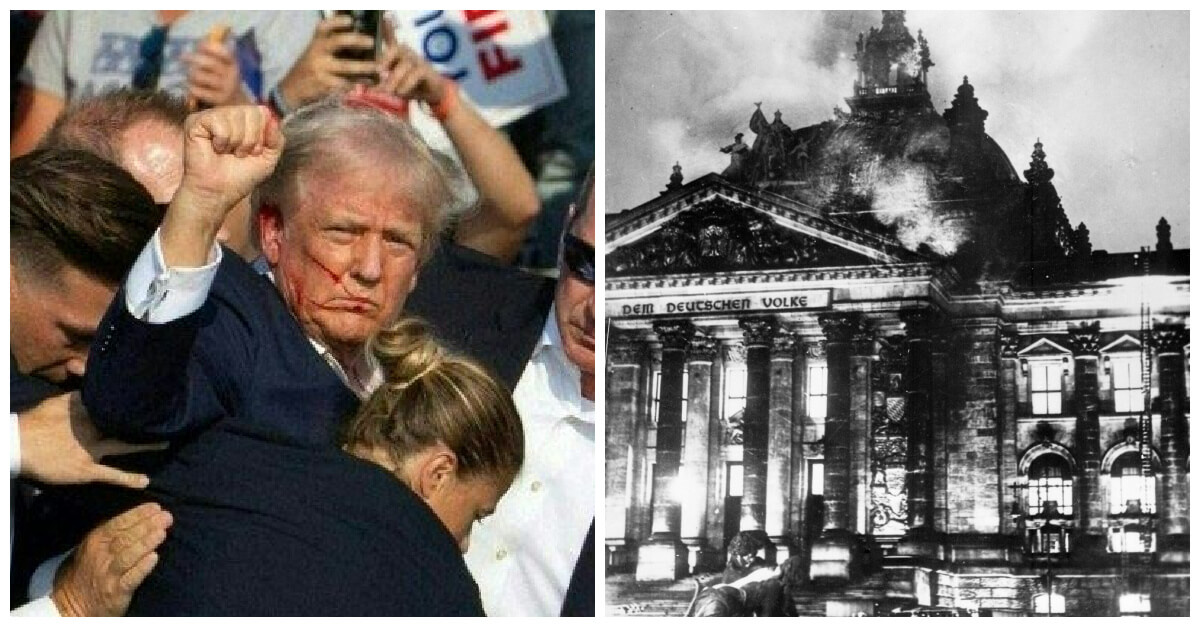Trump shot: What ‘Reichstag fire’ means and why it’s trending
The Nazi-era term has been invoked about Donald Trump before

Former President Donald Trump after an assassination attempt on July 13, 2024; the fire at the Reichstag building on Feb. 27, 1933. Photo by Getty Images/Wikimedia Commons
Soon after former President Donald Trump was shot at a campaign rally in Butler, Pennsylvania, on Saturday, the term “Reichstag fire” began trending on social media. Here’s what the Nazi-era term means and why people are talking about it.
What does ‘Reichstag fire’ mean?
Adolf Hitler was sworn in as chancellor of Germany on Jan. 30, 1933. About a month later, on Feb. 27, 1933, someone burned down the Reichstag building, home of the German parliament. Hitler blamed the fire on Communists, and claimed they were launching an uprising to take over the country. Hitler convinced Germany’s president to issue the Reichstag Fire Decree, which took away some civil liberties from people who opposed the Nazis and also provided legal cover to imprison those people. Historians point to the fire as key in the rise of Nazi Germany.
Why are people saying it’s a ‘Reichstag moment’ after Trump shooting?
Opponents of Trump have often criticized him for his history of invoking Hitler and the Nazis. Some of the former president’s critics think it’s not outside the realm of possibility for Trump to follow the playbook of the Reichstag fire and use the assassination attempt as the basis for whipping up fervor against his political enemies.
Bruce Bartlett, a former government official in the Ronald Reagan and George H.W. Bush administrations, issued a warning about Trump on the social platform X this past week, prior to the shooting, saying, “I bet he’s planning the American equivalent of the Reichstag fire to justify violence against the left.” After the shooting, Bartlett posted, “Looks like we just had our Reichstag fire.”
Australian politician Rex Patrick posted just after the shooting, “We might have just witnessed America’s Reichstag Fire moment.”
Journalist Joe Leyden shared, “Not sure whether I should be thinking about the #ReichstagFire right now. Not sure I shouldn’t.”
Others invoked the Nazi-era moment as well. Many of them were implying that Trump staged or arranged the shooting, which there is no evidence to support. There were additional ‘BlueAnon’ conspiracy theories spreading as well.
‘Reichstag fire moment’ has been invoked for Donald Trump before
Gen. Mark Milley, then-chairman of the joint chiefs of staff, said just before the Jan. 6 uprising at the Capitol, that then-President Trump “had led the country to the brink of its own Reichstag moment.”
On Jan. 6, historian Michael Beschloss posted a photo to X of the Nazi-era fire, captioned, “Fire in the Reichstag, Berlin, 1933.” The tweet was shared more than 1,300 times.
Masha Gessen, a Russian-American writer, wrote an in-depth essay in 2017 for Harper’s about Trump’s rise, “The Reichstag Fire Next Time,” which begins:
When each day brings more news than we are used to seeing in a week, and the kind of news that only the most catastrophic imagination can accommodate, we find ourselves talking about the Reichstag fire. Time feels both accelerated and slowed down, and so we imagine that we have been talking about the fire for years. It is the new president’s new clothes: invisible, yet always present in our perception of him.
What’s next with the Trump shooting investigation?
The FBI has identified the shooter, who was killed at the scene, as Thomas Matthew Crooks, a 20-year-old from Bethel Park, Pennsylvania, about an hour away from where the rally took place. The FBI has not released a motive for the shooting.
The Justice Department has said it will investigate. And Republican leaders of the U.S. House of Representatives plan to hold a hearing with the U.S. Secret Service about the assassination attempt, which killed one rallygoer — Corey Comperatore, a firefighter and father of two — and critically injured two others.
The Trump campaign said this week’s Republican National Convention in Milwaukee will continue as planned, with Trump set to become the party’s nominee on Thursday night.
A message from our CEO & publisher Rachel Fishman Feddersen
I hope you appreciated this article. Before you go, I’d like to ask you to please support the Forward’s award-winning, nonprofit journalism during this critical time.
We’ve set a goal to raise $260,000 by December 31. That’s an ambitious goal, but one that will give us the resources we need to invest in the high quality news, opinion, analysis and cultural coverage that isn’t available anywhere else.
If you feel inspired to make an impact, now is the time to give something back. Join us as a member at your most generous level.
— Rachel Fishman Feddersen, Publisher and CEO